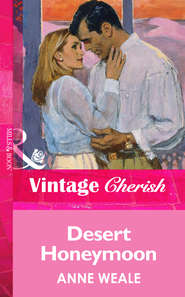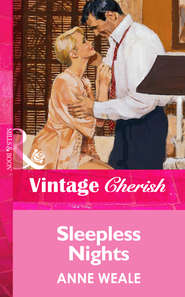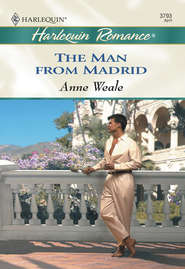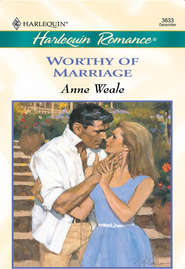По всем вопросам обращайтесь на: info@litportal.ru
(©) 2003-2024.
✖
The Bartered Bride
Автор
Год написания книги
2018
Настройки чтения
Размер шрифта
Высота строк
Поля
Reid, with his long-boned thoroughbred physique and his autocratic features, looked a descendant of generations of men who had felt themselves to be superior beings and never experienced the doubts felt by ordinary people.
In a different, more rough-hewn way, her father had been the same. Probably, somewhere far back in Reid’s ancestry, there had been a man like her father: a roughdiamond unscrupulous go-getter who had founded the Kennard fortune.
Perhaps, if George Turner had married someone better equipped to handle him than her quiet and easily cowed mother, her father might have been saved from becoming an overbearing braggart.
Whether, at thirty-four, Reid’s essential nature could be modified was problematical. But it could be interesting to try.
She said, ‘I don’t find you as transparent as you seem to find me. It takes me longer to make up my mind about people.’
‘You haven’t had as much experience of summing up people as I have.’
The butler reappeared. ‘Luncheon is ready when you are, sir.’
They ate in a smaller room with a view of a large garden, an oasis of well-kept greenery in the heart of the city. The surface of the round Regency breakfast table had the gleaming patina resulting from nearly two centuries of regular polishing. It reflected the colours and shapes of the red-streaked white tulips arranged in what Fran recognised as an antique tulip-pot, its many spouts designed to support the stems of flowers which had once been costly status symbols.
The meal began with potted shrimps served with crisp Melba toast, tiny green gherkins and a dryish white wine which they continued to drink with the main course, chicken with a minty yogurt dressing.
While they ate Reid talked about plays and art shows he had been to recently. It was the kind of conversation made by strangers at formal lunch parties and although his comments were interesting, Fran thought his choice of subjects irrelevant to this particular situation.
When the butler had withdrawn, leaving them to help themselves to a fruit salad with fromage frais, or to a selection of more substantial cheeses, she said, ‘Why do you want a wife when you could go on having girlfriends and change them when you get bored?’
Offering her the elegant Waterford compote, its apparent fragility emphasising the powerful but equally elegant form of the hands in which it was cradled, he looked at her with unexpected sternness.
‘I have a responsibility to my line. I need sons to carry on the traditions established by my predecessors.’
She found his solemnity irritating. ‘Are you expecting me to provide proof of my fertility?’
Before she could add that, if he was, he could forget it, Reid said, ‘No, I’m prepared to chance that.’
‘Big deal!’ Fran said sarcastically.
She had the feeling that Reid wouldn’t hesitate to divorce her if she failed to live up to his expectations in some way.
But although he struck her as a monster of coldhearted self-centredness, she couldn’t deny that he was extraordinarily attractive. Every movement he had made since they sat down had heightened her awareness of the lean and muscular physique inside the well-cut suit and the long legs under the table. His hair was dry now but still had the sheen of health. There was nothing about him suggestive of stress or tension. He seemed entirely relaxed. Yet why did he need to arrange a businesslike marriage instead of falling in love the way people usually did?
Wondering, suddenly, if he might be in the same situation as herself, heartbroken, although it didn’t seem likely, she said, ‘When did you dream up this scheme?’
‘It’s an idea I’ve had for some time...probably since my contemporaries started divorcing. I have about a dozen god-children, most of whom now have stepparents, some official, some not. I don’t want that for my children.’
‘Did your parents stay married?’
It seemed to her that his face underwent a change. His lips didn’t tighten. His eyebrows didn’t draw together. But there was a subtle hardening and chilling, reminding her of the impression of formidable coldness she had received yesterday morning when they sat on opposite sides of his imposing desk.
Now they were at a table designed for a more intimate and relaxed conversation. But she sensed a change in the atmosphere and knew she had trespassed in an area of his life where she was an unwelcome intruder.
‘They separated. They were never divorced,’ he answered.
Fran wanted to ask how old he had been when the separation happened, but something made her hold her tongue.
Later, going back to the flat in the taxi he had laid on for her, she regretted restraining her curiosity.
When—if—two people were going to many, there shouldn’t be any ‘No go’ areas between them...or at least none of that nature. His past girlfriends were not her business, but his family life certainly was. She shouldn’t have allowed herself to be put off. From now on she wouldn’t be, she told herself firmly.
Later that afternoon, her sister rang up.
‘How’s it going?’ Shelley knew about clearing the apartment but not about the interview with Reid.
‘I’ve more or less finished. How are things with you?’
‘Fine, but I’ve just been talking to Mum and she sounds at the end of her tether. You don’t think she might crack up...have a real nervous breakdown, do you?’
‘She wouldn’t dare,’ Fran replied. ‘Imagine Gran’s reaction to anyone in her family going to pieces. She’d consider it letting the side down.’
But despite her cheerful response, intended to soothe Shelley’s anxiety, Fran wasn’t as sanguine as she . sounded. Her mother’s state of mind had been worrying her for some time.
‘Gran’s made of sterner stuff than Mum,’ said her sister. ‘You’re like her and so am I, up to a point. But Mum’s nothing like her. She takes after Grandad’s sister, the one who was jilted and never really recovered.’
‘Maybe...a bit. But Great-Aunt Rose wasn’t strong and Mum is. There’s nothing wrong with her physical health. She’ll be all right, Shelley. Just give her time to get over the shock of it all.’
‘I hope you’re right.’ Her sister didn’t sound convinced.
‘I live with her. I ought to know. In some strange way it may be harder for a woman to come to terms with the end of an unhappy marriage than to lose a husband she loved. Mum can’t look back and say to herself, “Well, I can’t complain because we had thirty great years which is more than lots of people do.” Her marriage was one of the duds.’
‘You could be right. Even though everyone else feels it was all Dad’s fault they didn’t get on, I think she blames herself...and I guess if she had been different, he would have been. Still, that’s all in the past. What worries me is her future. She’s never going to marry again, that’s for sure, and she isn’t equipped to stand on her own feet. Somehow, between us, we’re going to have to look after her... but how?’
This was ground they had already been over several times and Fran didn’t want to rehash it until she had made up her mind whether the solution offered by Reid was feasible.
By the following morning she had come to a decision. She rang Reid and told him.
‘Good,’ he said calmly. ‘We’d better have dinner together. I’ll pick you up at seven.’
It seemed a prosaic response, but then this was a practical down-to-earth union they were setting up.
Not knowing where he would take her, but assuming it would be somewhere fairly sophisticated, she wore a white silk-satin shirt and a narrow black wrap-over skirt. She cinched her waist with a wide belt and fixed large rhinestone stars in her ears.
Reid called for her in a taxi, wearing a Savile Row suit and conventional shirt with an unexpectedly flamboyant tie in wonderful Gauguinesque colours.
When she complimented him on it, he said, ‘Even bankers have to break out sometimes.’
The restaurant he had chosen for the occasion was on the south bank of the Thames but high above the river with a panoramic view of the buildings on the far bank through walls made of sheets of glass. The décor was modern and minimalist, very different from the period elegance of his house in Kensington, although of course she hadn’t seen his own part of it.
‘You’ve been here before, I expect?’ he said, as they sat down in leather tub chairs.
‘No, as it happens I haven’t.’ She hoped the chef wasn’t a minimalist. She had a heartier appetite than many of the people who patronised London’s smart restaurants and tension always made her hungrier.
They had come directly to the restaurant without stopping off in the bar.
‘Something to drink before dinner, sir?’ the wine waiter enquired.











